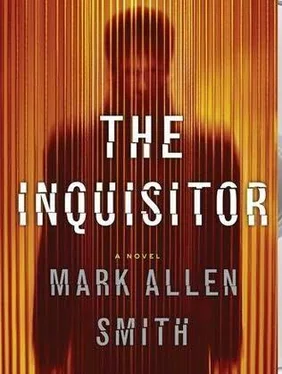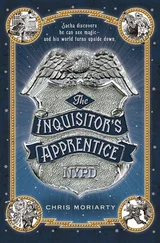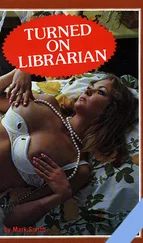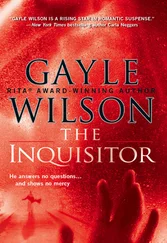Mark Smith - The Inquisitor
Здесь есть возможность читать онлайн «Mark Smith - The Inquisitor» весь текст электронной книги совершенно бесплатно (целиком полную версию без сокращений). В некоторых случаях можно слушать аудио, скачать через торрент в формате fb2 и присутствует краткое содержание. Жанр: Триллер, на английском языке. Описание произведения, (предисловие) а так же отзывы посетителей доступны на портале библиотеки ЛибКат.
- Название:The Inquisitor
- Автор:
- Жанр:
- Год:неизвестен
- ISBN:нет данных
- Рейтинг книги:5 / 5. Голосов: 1
-
Избранное:Добавить в избранное
- Отзывы:
-
Ваша оценка:
- 100
- 1
- 2
- 3
- 4
- 5
The Inquisitor: краткое содержание, описание и аннотация
Предлагаем к чтению аннотацию, описание, краткое содержание или предисловие (зависит от того, что написал сам автор книги «The Inquisitor»). Если вы не нашли необходимую информацию о книге — напишите в комментариях, мы постараемся отыскать её.
The Inquisitor — читать онлайн бесплатно полную книгу (весь текст) целиком
Ниже представлен текст книги, разбитый по страницам. Система сохранения места последней прочитанной страницы, позволяет с удобством читать онлайн бесплатно книгу «The Inquisitor», без необходимости каждый раз заново искать на чём Вы остановились. Поставьте закладку, и сможете в любой момент перейти на страницу, на которой закончили чтение.
Интервал:
Закладка:
Rita, the waitress with the bleached platinum beehive who often served them, arrived with her coffee pot. She knew not to bother talking to Geiger. With him it was always the same-black coffee, two refills, and hardly a word. Sometimes his gaze would meet hers, but there was no invitation in it. At first she’d taken his manner as coldness, but in time she’d seen her mistake: she’d interpreted his lack of warmth as the presence of its opposite, where, in truth, there was no emotion at all. She slid his cup over and poured, then slid it back and looked to Harry.
“Darlin’?”
Harry waved the offer away. “Already over my limit, Rita, and I’m paying for it.”
“Want the usual for breakfast, Harry?”
“Nothing today, hon.”
Rita moved on. Geiger put the sheets back in the folder.
“So what do you think?” Harry asked.
“Not a lot here to work with,” said Geiger.
Harry frowned. “I didn’t have a lot of time.”
“I wasn’t criticizing the effort, Harry.”
Harry nodded. There hadn’t been any negative edge to the words; there never was. Geiger’s neutral delivery was like an aural Rorschach test. Harry heard what he did or didn’t want to hear depending on his mood. Sometimes it made him nuts.
“Chances are very good that Hall’s client didn’t buy the painting legally,” said Geiger. “That’s why they don’t want the police.”
“That crossed my mind. Doesn’t matter, though-right?”
“Did you find out if any de Koonings have been stolen or gone missing in the last fifty years or so?”
“Uh-huh. Two-in 1979 and 1983.”
Geiger’s fingers danced on the tabletop.
“Harry, even if I get Hall the information he wants, there’s no way we’d know if his client ever actually gets the painting back. We’d never see the extra money.”
“We could make it part of the deal. If Matheson fesses up, I could go along with Hall when he gets the goods. Then we’d know.”
“No. The job is over when the session ends. We don’t go past that line. Inside versus outside, Harry. You know that.”
Harry’s head bobbed and his shirt-hanger shoulders hunched in a shrug.
“I know, I know. It’s just a ton of money.”
Geiger picked up his coffee, blew on it, and took a sip. Harry noted, as he often had before, that even this simple action was executed with the finesse of a ballet dancer.
“Harry, how much did we make last year?”
“A million and change.”
“Twenty-five percent of that is…?”
“Two hundred fifty.”
“And that’s how much if you paid taxes?”
“Four hundred and twenty thousand. Okay, okay.”
Geiger held his coffee cup against his chin. In an asap scenario the Jones is more of an X factor and the clock is ticking. Ordinarily Geiger didn’t like to count on luck, but when the client was in a hurry he had no choice: he was forced to hope that the Jones would slip up. Sooner rather than later, the Jones would have to show something-a weakness, a phobia, a demon-and then Geiger would play it for all it was worth. Asaps were always tricky, but they did provide their own kind of challenge.
Geiger put his cup down. It didn’t make a sound.
“Tell Hall it’s a go,” he said.
Harry’s lips sprang up at the corners in a hallelujah smile.
“Have him snatch Matheson now,” Geiger said. “Make the session for midnight, Ludlow Street.”
Geiger had an appointment with Corley coming up that afternoon, but first he wanted to go to the Museum of Modern Art because Harry had said there were some de Koonings there. Geiger had never been in a museum. Carmine had taken him to a gallery in SoHo once-Carmine was a serious collector-but Geiger had been unmoved. Paintings, sculpture, photographs-they weren’t like music. They were unchanging images, and staring at them was a static event for him. But having an appreciation of a Jones’s passion is a valuable asset in IR, so he was going to see what it was that David Matheson craved.
He walked through Central Park. The sun was a yellow decal stuck onto the sky, and softball teams were out in full regalia. The park was where he had first started studying squirrels. They were marvels of psychic economy, each reflex and movement ruled by fear. Geiger sometimes watched a squirrel stop in mid-step and freeze with its paw raised for thirty seconds as it weighed a potential threat.
Soon after he’d moved into his house, he’d started an experiment to see if he could change and control their behavior. For a week, he put a pile of sunflower seeds by the birch tree in the backyard and watched from the stoop as the squirrels ate them. Then one morning he sat down by the tree, hand open in his lap and filled with seeds. He stayed absolutely still for an hour. For three mornings, a squirrel would venture within five or six feet of him, freeze, and then sprint away. Geiger realized that as the squirrels came closer, his heightened anticipation caused changes in him-pulse rate, gaze, breathing pattern-that set off their internal alarms. He would have to change his behavior to control theirs.
The next morning he sat by the tree with his eyes shut, playing a symphony in his head, denying his senses all knowledge of the external. In two days they were picking seeds from his hand; after four days they were eating while perched on his calf or thigh.
Geiger brought that experience into the session room-the ability to change his behavior to suit a scenario and to create a state of dread in the Jones while he could still function and make choices. If a squirrel’s hardwiring allows a respite from fear only when it is up a tree, Geiger’s goal was not to make the Jones fear that he’d never get back to the tree, but to make him forget that trees existed at all.
Recently he had told the story of the squirrels to Corley. It was one of the few times he had volunteered information about a contemporary event, and Corley had responded by asking if he felt “disconnected from people.”
Geiger answered, “Martin, if you’ve never been plugged in, you can’t be disconnected.”
Geiger was aware of his differentness. Of the one hundred and sixty-eight hours in a week, he spent approximately five with Harry, one with Corley, and, on average, fifteen with the Joneses. Living the rest of his life alone was not a choice. It was his organic state. The parts of himself that Geiger knew, he knew very well. The parts he didn’t know, he knew not at all. Life before New York was without definition-a black room-and when he peered into it, the darkness offered faint answers. But when the dream started, it was as if a flash of lightning filled the room, and he could see that the space was endless, without borders. The dream gave him half a second’s glimpse of the room’s contents: countless faces, bodies, trees, unrecognizable shapes. That is where Corley came in. Geiger told him about the dream and its variations, and he used Corley’s eyes to help him see into the black room and discover who he was and what he had been. Geiger did this because the more he knew about himself, the more he could bring to the job. It was all about IR.
The dream had come to him again, last night, and the aftermath had been the same. He woke up at four A.M. and saw the flashes of lights announcing the powerful migraine that was already moving like a storm front into the left side of his brain. The dream’s details changed but the structure was always the same: Geiger, as a preteen boy, would rush out of someplace and try to get to a destination that was never clear. On his journey, which was filled with obstacles, he would sooner or later start to literally come apart: first his digits and then his limbs would drop off. When his head was about to fall off he would wake up.
Читать дальшеИнтервал:
Закладка:
Похожие книги на «The Inquisitor»
Представляем Вашему вниманию похожие книги на «The Inquisitor» списком для выбора. Мы отобрали схожую по названию и смыслу литературу в надежде предоставить читателям больше вариантов отыскать новые, интересные, ещё непрочитанные произведения.
Обсуждение, отзывы о книге «The Inquisitor» и просто собственные мнения читателей. Оставьте ваши комментарии, напишите, что Вы думаете о произведении, его смысле или главных героях. Укажите что конкретно понравилось, а что нет, и почему Вы так считаете.












